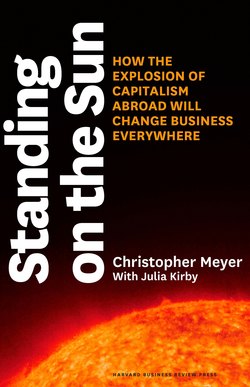Читать книгу Standing on the Sun - Christopher Meyer - Страница 16
На сайте Литреса книга снята с продажи.
Trading New Goods
ОглавлениеThere's a related fundamental development in capitalism's environment: the source of value has changed. What people pay for in markets is increasingly intangible rather than tangible. This has been a long-term trend—perhaps as long as human history—and it shows up markedly in the shift every developed economy has experienced from product manufacturing to service provision. But it's also about products. The price of a product like Apple's iPad has very little to do with the cost of the plastic, metal, and silicon that go into its manufacture. What customers value is its design, its connectedness, its intelligence.
When the source of value changes, it has big implications for the economic system. And information has unique economic properties. As a simple example, land doesn't depreciate—but property, plant, and equipment do. Thus the shift from an agrarian to an industrial economy called for new capitalization solutions, accounting rules, and financial instruments. Likewise, as we move from an industrial to an information economy, we must deal with a new fact of life. Although mass-produced, tangible goods have substantial marginal production costs, information goods have essentially zero marginal costs. Once someone has paid for the first recording or software solution or essay to be created, any additional copies are almost cost free. In a world where many goods cost nothing, it is meaningful to talk of a gift economy—and new approaches must be devised to fairly fund the creation of new goods. Insisting on retaining the old models—copyright and patent systems, for example—as they are is a rear-guard action.
When we refer to information goods we are talking about much more than the media and entertainment offerings that consumers buy. We're also talking about the “machine tools” of the information economy: CAD/CAM software, spreadsheets, website designs, instructional videos. In the industrial world, both tools and offerings were tangible: behind the manufacture of a physical tube of toothpaste was a physical toothpaste-making machine—and it was, and remains, expensive. Consumers didn't pay for the machines, but through their consumption of toothpaste they funded them. Today, the media industry is in turmoil because the marginal costs of the goods they produce is zero, and so people readily give them away (try giving away your used toothpaste). But increasingly, the capital equipment of the information economy is also information goods, and these production tools are also being shared freely.
When Linux appeared and then succeeded, the self-organized network of volunteer coders was remarked on, but few observers outside the software industry—and not many within it—considered it of great importance. When Wikipedia appeared and put Microsoft's Encarta out of business, commentators began to see Web 2.0 as a mode of production. Now SourceForge.net, a product of Geeknet, Inc., is a superstore of open source software and a hangout for volunteers who want to work on it, a kind of global souk for free machine tools—230,000 of them.
The ability to freely share capital equipment undermines some of the most well established ideas about barriers to entry. It challenges the very meaning of terms like capital and ownership. It also suggests the rate of innovation will continue to accelerate. Thanks to free sharing, innovations become instantly available everywhere. Imagine how rapidly the Industrial Revolution would have progressed if machine tools had been free.
